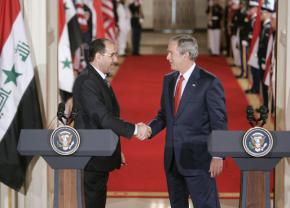The first redraft of history
In the wake of the U.S. pullout from Iraq, politicians and the media seem to be suffering from amnesia about what happened and why. remembers for them.
ON DECEMBER 18, the last U.S. military forces were pulled out of Iraq in the middle of the night with the same gallantry that marked the entire war. As they rode toward Kuwait in the dark, some wondered aloud to reporters "how the Iraqis, whom they had worked closely with and trained over the past year, would react when they awakened on Sunday to find that the remaining American troops on the base had left without saying anything."
Thus did George Bush's glorious war to bring Judeo-Christian liberation to the Middle East finally come to a close--in a manner befitting the morning after a drunken fling.
Nitpickers will point out that there are still about 5,000 mercenaries serving as security for the U.S. "embassy" in Iraq. But that's really nothing for post-9/11 America, which doesn't even view bombing a country every day for six months as "rising to the level of hostilities." (Apparently, that Libya thing was more like passive aggression.)
It was the Iraq war in 2003 that changed these standards and turned imperial language into a Foster's beer commercial (show image of water-boarding in Guantánamo; cue voiceover with an Australian accent: "ENHANCED INTERROGATION.")

For most of the last decade, Iraq was the starting point for America's global strategy and the key fault line that divided people in the U.S.--if not the political parties that claim to represent them. Today, you can find it in that moldy box in the attic that labeled "history."
MEDIA REPORTS describe Iraq's "growing political and sectarian discord" as if an entire civil war didn't just happen on America's watch. Iraqi politics certainly don't look promising at the moment, but it's hard to top the recent two-year stretch when more than one-eighth of the population was driven from their homes.
Any day now, we can expect to hear that America actually invaded Iraq to prevent a civil war. New York Times columnist Thomas Friedman is already almost there:
America and its allies...laid the groundwork for the most important product of the Iraq war: the first-ever voluntary social contract between Sunnis, Kurds and Shiites for how to share power and resources in an Arab country and to govern themselves in a democratic fashion.
"Social contract" seems a tad strong in describing the teetering balance of power among sectarian militias. I don't remember John Locke mentioning anything about death squads. I wonder what he might have thought about this 2005 Newsweek report about the use of the so-called "Salvador option":
[O]ne Pentagon proposal would send Special Forces teams to advise, support and possibly train Iraqi squads, most likely hand-picked Kurdish Peshmerga fighters and Shiite militiamen, to target Sunni insurgents and their sympathizers, even across the border into Syria, according to military insiders familiar with the discussions. It remains unclear, however, whether this would be a policy of assassination or so-called "snatch" operations, in which the targets are sent to secret facilities for interrogation.
It's like being a fly on the wall of a salon in Enlightenment France!
Events proceeded accordingly: Team Bush saw that its dreams of an easy war and an oil-spewing puppet regime were dashed, so they let Shia militias (social "contract killers"?) do the fighting for them until the Sunnis were driven out of Baghdad and had concluded that they needed to form an American-backed force of their own.
Thomas Friedman isn't some revisionist historian dramatically reinterpreting the War of 1812. He's passing off a bizarro version of events that are still fresh in the minds of every pre-Bieber American.
Except that they're not. History has never been a big concern in this country, peopled by immigrants fleeing their pasts and slaves robbed of theirs. For two centuries, the U.S. was the rising can-do power, with no patience for the seemingly irrelevant lessons of the past. That era is over, but we seem to have jumped straight into senility--the awful kind that keeps lashing out at new countries without understanding or even fully remembering the last violent episode.
But the main reason that the Iraq war has been so quickly forgotten is the very man who was elected president because of his opposition to it. Barack Obama made Iraq amnesia official policy when he declared he would not investigate Bush officials for war crimes (like forming sectarian death squads) because "we need to look forward as opposed to looking backwards."
Obama's "no backsies" doctrine, which was later applied to the entire banking industry, is a novel approach to criminal justice, which everywhere outside of Phillip K. Dick stories is focused on crimes that took place in the past, rather than the future.
Of course, it will never work that way for the Ninety-Nine Percent. History haunts most Americans on a daily basis, in the form of prior convictions, student debt and a hundred other ways. The history of the Iraq War lives on as well, not only in the societal wreckage of Iraq, but in this country as well, among the tens of thousands of dead and wounded soldiers, and the services that have shrunk while the Pentagon has grown.
That's one reason we ought to remember it. I'll get to the other in my next article.


